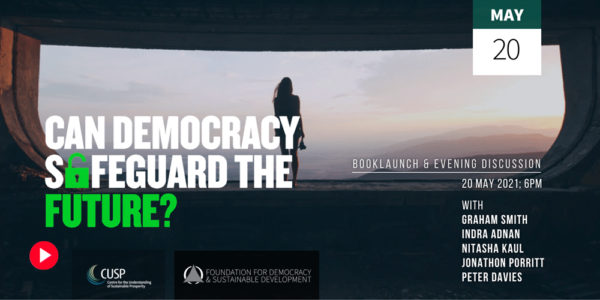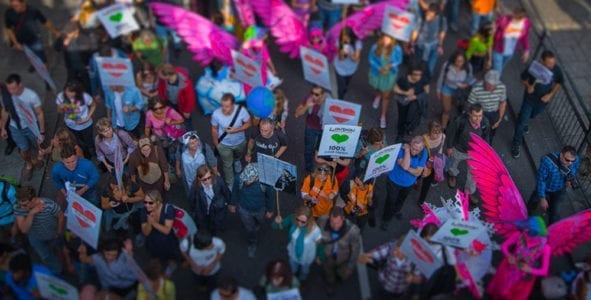Participatory performance as policy-making
This is the second blog in Malaika Cunningham’s series Collecting Real Utopias. In each blog, she is exploring a different project, system or institution which is challenging extractivist capitalism by practically demonstrating alternative ways of living and/or organising. This series is based on the work of the late sociologist Erik Olin Wright. Read the first blog of the series here. This article also appeared on the Arts Admin website.
Democracy and democratic ideals are a key feature of many of the real utopias presented by Erik Olin Wright. This is also true of the projects I’ll be discussing over the course of this series, from co-operatives to land justice movements. All of them celebrate and embody democracy in some way: at times that’s through the direct engagement of participants within governance, or sometimes it’s through building egalitarian models for access to resources. With all this in mind, exploring a project which directly aims to re-imagine how we ‘do’ democracy and policy-making seems a good place to start.
Before I begin it is again important to acknowledge that the term ‘real utopia’ does not mean without flaws or limitations. These projects occur within reality and exist within flawed systems – even as they try to challenge those systems. They are led by people who will not always get it right. However, these projects aim to “embody in one way or another emancipatory alternatives to the dominant forms of social organisation” (Olin Wright, 2010, p. 1). None of the projects I explore in this series actively self-identity as real utopias. I am using this framing as I believe there is value in using Olin Wright’s framework to identify models, projects, and institutions which can offer us hope, inspire us to try things differently, and offer us tangible ‘waystations’ on the road to building a more just and sustainable society.
OK – back to re-imagining democracy.
When we think about our democratic system, mostly we think about political parties, voting, perhaps referendums. Perhaps (particularly right now in May 2021) we think about elitism and corruption too. On the other hand, there is this ideal of democracy – a vision of governance which is inclusive, equal, and fair. A democracy in which all citizens are heard and have multiple opportunities to engage – and this engagement is enjoyed broadly across the population. It is defined by plurality, rather than polarisation. Moving from our current democratic system to this ideal of democracy is a vast project – and one which is crucial to creating an environmentally and socially just society. For some interesting proposals for how this move could happen check out Can Democracy Safeguard the Future? by Graham Smith, and some of the fantastic essays in the CUSP series curated by Will Davies.
I believe one of the most exciting models for bridging the gap between our reality and the ideal of democracy is Legislative Theatre. Initiated by Augusto Boal in Rio de Janerio in the 1990s, it forms part of the arsenal of the Theatre of the Oppressed. Legislative Theatre is a means by which we might create policy, alongside citizens, using interactive theatre.
Briefly, here’s how it (generally) works: a performance piece about a specific issue or oppression is created by a group who have experience of this oppression. The piece depicts the problems and oppressions currently faced by this group and, crucially, the performance piece ends badly for the protagonist. This piece is performed to an audience made up of policy-makers, others affected by the issue, and the general public. After the performance is finished, the ‘forum’ begins. In the forum the audience become ‘spect-actors’ and can chose to go back to specific moments in the performance, replace the protagonist and experiment with alternative methods by which we might overcome the oppressions faced. These interventions lead to discussions, and more interventions, and more discussions. These discussions and interventions are then ‘metabolised’ into policy recommendations. This process, from the creation of the performance piece to the ‘forum’, is facilitated by the Joker (so named as the role belongs to neither the audience or actors, just as a Joker belongs to no suit in a pack of cards). Augusto Boal was a vereador (legislator) in Rio when Legislative Theatre was born and was able to use this technique to create several policies which passed into law. Since these early experiments Legislative Theatre has been attempted all over the world. Some of these projects have been symbolic events, designed to demonstrate the technique, whilst others have been specifically focussed on policy change (with varying levels of success).
An important company in this field is Theatre of the Oppressed NYC (TONYC), who have been using Legislative Theatre to work with policy-makers and communities across New York since 2011 (founded by Katy Rubin, who trained with Augusto Boal). Katy Rubin has recently moved to the UK and is leading on several Legislative Theatre projects across the UK. In Manchester, she has been working with the Greater Manchester Local Authority and a cohort of new Jokers to write the Homelessness Reduction Strategy. I have invited a couple of these Mancunian Jokers to tell us more about this project as part of Season for Ex-Change.
I believe that there are many exciting opportunities that Legislative Theatre could open up in relation to how we do policy-making. This is a short blog, so I will limit myself to two.
The first is that Legislative Theatre does not only provide an opportunity to invite a broad and diverse range of people into the policy-making space, but is also opens up a plurality of modes of political discourse. Legislative Theatre welcomes emotional expression, performance, specific (and often personal) policy knowledge, stories, alongside theoretical arguments. All of these contributions are treated as equally valid forms of political discourse (when Jokered well). In many policy-making spaces there is only one mode of political discourse: formal, rational argument. These are, of course, important in making political decisions, however, it also implicitly prioritises certain types of voices. Iris Marion Young calls this ‘internal exclusion’. We may do really well at making sure there are a diverse range of perspectives in a policy-making space, but if we only adopt this traditional approach to discourse, many will be go unheard. This is one way I think that Legislative Theatre can help us to re-imagine what democratic spaces look like: by legitimising and making opportunities for personal stories, emotion, and even non-verbal expressions within political discourse. In this way, we can ensure that participatory policy-making spaces include a broader range of voices.
The second opportunity I think Legislative Theatre might offer is bringing a spirit of playfulness to policy-making spaces. We should find joy in our political engagement – to “make justice and liberation the most pleasurable experiences we can have on this planet” (adrienne maree brown, 2019, p. 13). Legislative Theatre is a space of playing. It brings laughter into the space, it disrupts power dynamics, and invites silliness. A key role for the Joker is to get the ‘forum’ going and to facilitate interventions. In the UK this often requires a lot of humour, to cox out those first interventions. This humour and playfulness makes the spect-actors feel safe, and in turn builds confidence for further interventions and discussion.
This playfulness also invites imagination by blurring some of the lines between reality and fiction. The story presented is fictional, yet it is based on reality and performed by those with these experiences. Interventions take place within a fictional realm, but they aim to impact on real policy. This blurring can open-up more radical approaches to how things may be different, because within these fictional spaces we are less inhibited by what feels immediately ‘possible’, and can focus instead on how things should/could be.
There are more opportunities, and there are also limitations to this work, but I shall leave it there for now. If you are interested in this field, I would encourage you to check out the work of TONYC, as well as Augusto Boal’s own book – Legislative Theatre: Using Performance to Make Politics.
Legislative Theatre, and the role for participatory theatre in policy-making spaces, is something I think about a lot. I wrote my thesis last year on this topic and will be publishing more articles about these ideas. Excitingly, I’ll also be doing some practical experimentation with later this year with my theatre and interactive arts company, The Bare Project, in partnership with Shared Futures CIC. In this project, we hope to experiment with using participatory theatre methodology (taking inspiration from Legislative Theatre) to re-imagine how we facilitate environmental citizen’s assemblies. I will certainly be sharing more on this project in the months to come!
Join Malaika’s two-part event for Season For Ex-Change, Finding Hope & Solidarity in Real Utopias. On Wednesday 19 May and Thursday 20 May, both at 1pm.



